 1 citations,
December 2013 in “Turkderm”
1 citations,
December 2013 in “Turkderm” Use of cosmeceuticals during pregnancy and breastfeeding is not recommended due to insufficient safety data.
 September 2020 in “Journal of the turkish academy of dermatology”
September 2020 in “Journal of the turkish academy of dermatology” Some dermatology patients in Turkey use traditional medicine, with herbal remedies being most common, but these treatments can have mixed results and risks.
 185 citations,
August 2020 in “Mayo Clinic Proceedings”
185 citations,
August 2020 in “Mayo Clinic Proceedings” Men are more likely to have severe COVID-19 cases and fatalities than women due to factors like lifestyle, aging, and biological differences.
 20 citations,
February 2017 in “International Journal of Dermatology”
20 citations,
February 2017 in “International Journal of Dermatology” Honokiol helps protect skin from damage and aging caused by cigarette smoke.
 11 citations,
April 2018 in “Nutrition Research”
11 citations,
April 2018 in “Nutrition Research” Chromium supplements don't help with weight loss or improve hormone and metabolism issues in people with polycystic ovary syndrome.
 8 citations,
November 2015 in “Saudi Journal of Biological Sciences”
8 citations,
November 2015 in “Saudi Journal of Biological Sciences” A mix of Panax ginseng and bee-pollen may help prevent prostate enlargement in rats.
 5 citations,
January 2016 in “Asian pacific Journal of Tropical Biomedicine”
5 citations,
January 2016 in “Asian pacific Journal of Tropical Biomedicine” Phthirusa pyrifolia extract may lower testosterone and harm male rat reproduction without damaging the liver or kidneys.
 1 citations,
January 2015 in “Journal of Pigmentary Disorders”
1 citations,
January 2015 in “Journal of Pigmentary Disorders” Treating melasma in men is difficult, especially for the deeper skin layers, and may need more than just topical treatments.
 January 1993 in “Side effects of drugs annual”
January 1993 in “Side effects of drugs annual” Natural products like propolis are causing more skin allergies, and certain skin treatments and medications have various side effects and risks.
 March 2024 in “International journal of pharmaceutical and bio-medical science (Print)”
March 2024 in “International journal of pharmaceutical and bio-medical science (Print)” Angelica Sinensis and Chinese Arborvitae have various medicinal benefits, including anti-inflammatory and anti-cancer effects.
 4 citations,
January 2019 in “International journal of bioorganic chemistry”
4 citations,
January 2019 in “International journal of bioorganic chemistry” Using medicinal plants traditionally helps in their preservation in Charmang Village, Pakistan.
 October 2022 in “Journal of the American Academy of Dermatology”
October 2022 in “Journal of the American Academy of Dermatology” "Clean" shampoos use fewer allergenic preservatives than traditional ones but still contain fragrances, and their actual risk of causing skin reactions is unclear.
 1 citations,
October 2021 in “Jundishapur Journal of Natural Pharmaceutical Products”
1 citations,
October 2021 in “Jundishapur Journal of Natural Pharmaceutical Products” Ficus carica leaf extract may help treat melanoma by promoting cancer cell death without harming normal cells.

Cold-pressed rapeseed oil is most resistant to oxidation and certain oils may reduce chronic disease risk; consumers like the taste of pumpkin oil best.
 January 2023 in “International Journal of Molecular Sciences”
January 2023 in “International Journal of Molecular Sciences” Maxillariinae orchids contain 62 compounds with potential health benefits, including treating skin conditions and diseases like cancer and diabetes.
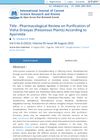 August 2022 in “International Journal of Current Science Research and Review”
August 2022 in “International Journal of Current Science Research and Review” Ayurveda can make poisonous plants medicinal through specific purification processes.
 December 2021 in “Daehanhanuihakoeji”
December 2021 in “Daehanhanuihakoeji” The traditional herbal formulas Yongdamsagan-Tang and Paljung-san, along with the drug finasteride, can reduce inflammation and may work together without affecting each other's effectiveness against benign prostatic hyperplasia.
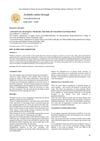 1 citations,
June 2019 in “Journal of Biological and Scientific Opinion”
1 citations,
June 2019 in “Journal of Biological and Scientific Opinion” PPD in mehendi can cause serious health problems and needs regulation.
 21 citations,
June 2017 in “Journal of Dermatological Treatment”
21 citations,
June 2017 in “Journal of Dermatological Treatment” Topical cetirizine improves hair density and thickness in androgenetic alopecia, but more research is needed.
 3 citations,
September 2016 in “Natural Product Communications”
3 citations,
September 2016 in “Natural Product Communications” Germacrene analogs, especially 8-Hydroxy germacrene B, are more effective than germacrone at blocking a hormone-related enzyme and could help treat hair loss.
 2 citations,
August 2017 in “Dermatologic Therapy”
2 citations,
August 2017 in “Dermatologic Therapy” Topical cetirizine 1% increases hair density and may be a promising treatment for hair loss.
 1 citations,
October 2015 in “CRC Press eBooks”
1 citations,
October 2015 in “CRC Press eBooks” Nutricosmetics with active ingredients can help with hair loss and improve hair growth.
 September 2023 in “Medical lasers”
September 2023 in “Medical lasers” The botanical shampoo with Morus alba root extract is safe and effective for treating hair loss.
 October 2018 in “InTech eBooks”
October 2018 in “InTech eBooks” The most effective treatments for hair loss are minoxidil, finasteride, PRP, and hair transplants, with steroids and immunosuppressants for autoimmune types.
 February 2014 in “Journal of The American Academy of Dermatology”
February 2014 in “Journal of The American Academy of Dermatology” 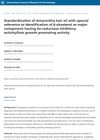 August 2021 in “International Journal of Research in Dermatology”
August 2021 in “International Journal of Research in Dermatology” Amarantha hair oil contains β-sitosterol, which helps promote hair growth.
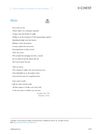 2 citations,
October 2020 in “Journal of Investigative Dermatology Symposium Proceedings”
2 citations,
October 2020 in “Journal of Investigative Dermatology Symposium Proceedings” The botanical treatment for hair loss shows promise, especially for children.
 2 citations,
April 2016 in “PubMed”
2 citations,
April 2016 in “PubMed” Using Minoxidil 2% solution with a botanical hair solution twice daily can significantly improve hair growth and quality in women with Female Pattern Hair Loss, boosting self-confidence and attractiveness.
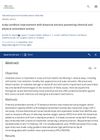 November 2024 in “International Journal of Cosmetic Science”
November 2024 in “International Journal of Cosmetic Science” Botanical extracts can improve scalp health by reducing oxidative stress.
March 2022 in “Journal of cosmetic dermatology” Botanical extracts can help treat hair loss in people with certain genetic conditions.





























